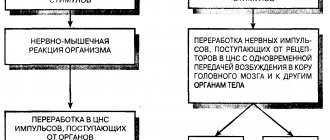4.5
Average rating: 4.5
Total ratings received: 2053.
4.5
Average rating: 4.5
Total ratings received: 2053.
Discipline is a word that is synonymous with the concept of “order.” The rules of social existence are based on people's understanding of discipline, compliance with special requirements, norms and legal provisions.
The material was prepared jointly with a teacher of the highest category, Ekaterina Valerievna Alexandrova.
Experience as a history and social studies teacher - 11 years.
What is discipline?
The 7th grade of the “Social Studies” course suggests looking at the term from different angles, which is why there are several definitions of the concept. Discipline is:
- compliance with certain rules established in society (group, team);
- the order that was required to be observed in society: the rules of morality and law;
- the requirements underlying the code of professional relations of a particular organization;
- the boundary that separates the norm from the offense.
V. Dahl gives his interpretation of discipline. He considers the concept only military: the order of subordination of one rank to another, obedience and strict obedience.
In the encyclopedic dictionary of the authors Brockhaus and Efron, the term is defined in the meaning of education, school rules.
Discipline changes people's behavior, introduces order and a system of control over their actions and actions.
https://youtu.be/nr4rAt7yb4I
When penalties are not applied
The law does not establish preferential categories of workers who cannot be held accountable for violation of discipline. But there are procedures for applying penalties and deadlines that must be observed.
At the same time, it is necessary to take into account guarantees for certain categories of workers.
Example:
A pregnant woman, according to Art. 261 of the Labor Code of the Russian Federation, it is impossible to dismiss at the initiative of the employer, except in cases of liquidation of the enterprise. But this does not mean that one should turn a blind eye to the violation. It is necessary to use other collection measures.
For guilty actions, the employer holds the employee accountable, including dismissal, if this is provided for by the norms of the Labor Code of the Russian Federation. Even if as a result the employee loses some benefits.
The Constitutional Court of the Russian Federation, in its ruling dated June 23, 2015 No. 1243-O, recognized the dismissal of an employee for absenteeism as legal, as a result of which she will lose the housing received under the target program, as she will lose her benefits.
In addition, penalties cannot be applied if deadlines are missed.
Types of disciplines
Scientists divide the discipline into 2 large groups: compulsory and special.
TOP 3 articles
who are reading along with this
Why is it important to obey laws?
What does it mean to live by the rules?
Morality and ethics: similarities and differences
- Mandatory . This discipline is a set or system of rules for government agencies and organizations. They must be observed by officials, government officials, and ordinary citizens.
- Special . Its rules apply only to a specific team. School, army, production - impose their own special requirements of discipline on people's behavior.
There are many special disciplines. Some of them are discussed at school.
- Military discipline . These are rules based on the greatest rigor of execution. All norms are approved in the Charter. Laws and requirements cannot be discussed or changed at one’s discretion; they are simply carried out unquestioningly. The oath and order are not changeable. Military and state secrets are protected and become one of the requirements of military discipline.
- Labor discipline . These are the rules of labor activity, relations in the production team. Standards for working hours, rest periods, and the beginning and end of the working day are established here. This type is enshrined in labor laws. But each specific work collective, on the basis of the Law, develops its own labor rules and collective agreements. The rules are prescribed in various instructions.
Violations of military discipline have their own system of punishments, which are not similar to labor offenses, but both lead to damage. The first within the country and a specific sector of the army. The latter cause economic problems.
Consequences of violation
As liability for non-compliance with labor rules, the employee is subject to a penalty, the choice of which depends on the severity of the offense:
- comment;
- rebuke;
- dismissal for appropriate reasons.
Application of several penalties for one offense is not allowed.
The Labor Code prohibits the use of penalties not established by law (Part 4 of Article 192 of the Labor Code of the Russian Federation). For example, monetary fines or deprivation (reduction) of bonuses are not used as disciplinary penalties for failure to comply with discipline. Local acts, including orders, on the application of monetary fines are illegal.
As for the option of depriving a bonus as an edifying measure: bonuses, in accordance with the Labor Code of the Russian Federation, are an incentive payment and not a penalty measure. But if the enterprise has a bonus system, then the regulations on bonuses provide for which the employee’s bonus is reduced or not paid in full. One of these conditions is failure to fulfill duties. In this case, the local act on bonuses must establish the conditions and procedure, including documentation, in accordance with which the amount of the bonus is reduced or the employee is deprived of the bonus completely.
Classification of discipline
Society requires people to follow rules. Why is discipline needed? Philosophers for many centuries have tried to understand its essence. Their work necessitated the division of the discipline into two more groups:
- external;
- internal.
External discipline. This is control by other people. Using the example of school discipline, these are the requirements that the administration and teachers make of students. This type is undergoing changes. You can compare the school rules of the past with the modern state of affairs and make sure that they have become simpler and more democratic. External discipline is fear of punishment. Someone is constantly monitoring her.
Internal discipline is a different kind. Here everything happens inside a person. He creates the rules himself, implements them himself, and chooses the punishment for their violation. It is called self-control, self-discipline or consciousness.
Internal discipline educates a person, external discipline does the same, but in its own way. In any case, the term is aimed at society and relationships among people.
How to become disciplined
To develop self-discipline, you need to make commitments that you can build on in the future. A person who has become morally stronger will be able to inspire himself and others to new achievements. To develop discipline, experts recommend writing down your goals and plans on paper, and setting a specific time frame for them. Reporting should be introduced periodically to track progress and also see what else needs to be worked on to achieve what you want.
To develop self-discipline, you will have to give up empty entertainment and concentrate all your attention on your goal and awareness of the matter. However, this is often hindered by excessive impulsiveness and distraction. As fatigue increases, a person may also lose the desire to develop discipline. The Internet, TV, junk food, social networks, constant messaging in instant messengers are also enemies that interfere with self-development. Effective methods of increasing discipline:
- Sport. Training can not only create a beautiful body and improve overall well-being. Exercise also helps develop willpower. Namely, strong-willed people achieve their goals.
- Daily routine and nutrition. Normal sleep can normalize the mental and physical state of the body. A proper diet and diet will charge a person with a portion of energy, making him more alert and ready to move mountains on his way.
- Plan. If there are no clearly defined goals and ways to achieve them, then discipline cannot be formed. Therefore, it is necessary to plan your life for some time in advance.
- Work on yourself. It's always quite difficult to work on something if you're constantly distracted and with your head in the clouds. Therefore, it is very important to concentrate and develop perseverance.
- Motivation. This is an important moment in the development of the discipline. Everyone should know why he performs certain actions, for what purpose.
A disciplined person can be called one who is able to think and separate the secondary from the important. If you learn to set your own priorities, move only towards your goals, and specifically free yourself from those beliefs that are often imposed from the outside, then you can cultivate self-discipline and responsibility. When a person learns self-discipline, it will become much easier for him to manage himself, as well as achieve real results.
Structure of the program U.D.
As a rule, each university draws up its own academic discipline program. At the same time, it must comply with unified state educational standards.
Typically the program consists of four sections:
- Passport. It describes the scope of application of UD, its goals and objectives, its place in the structure of the main professional educational program, as well as the total number of academic hours allocated to the study of this subject.
- Structure and content. This section describes the types of academic work and the amount of time allocated for them. The content of the academic discipline is also described in detail here.
- Conditions of implementation. This section provides a list of material and technical support necessary for the student to fully master the subject being studied. A list of literature on the discipline is also provided here. Moreover, there is a separate list for students, and a separate list for teachers.
- Monitoring and assessing the level of mastery of the presented material. This section describes what pupils/students must learn and how the teacher will test their knowledge (oral quizzes, quizzes, independent work, etc.). Also, there must be criteria for assessing knowledge and skills; the procedure for forming grades for the discipline.
In addition to the points above, some programs may contain additional information, such as examples of assessment tools for monitoring and certification. As well as data on the educational technologies used (can be supplemented with methodological recommendations).
Limitations and the child
Discipline can be a powerful weapon for pacification. If an adult understands that one must adhere to certain rules, then discipline can become a real test for children . When raising a child, it is important to take into account an individual approach so as not to traumatize him with restrictions or prohibitions. He must clearly understand why this cannot be done and why he was punished.
Proper application of discipline will help develop a sense of justice and lay a good foundation for the development of a future personality. Many adults mistakenly consider discipline to be a manifestation of aggression and often take out their anger on the child - no, upbringing should be calm. If children feel offended or aggressive, they close themselves off and try to isolate themselves from the world around them.
An adult must have patience and clearly explain to the child why he is being punished. You cannot simply intimidate or physically influence children, as this can cause them to develop nervousness and a feeling of uselessness. A child should always have a choice of what to do: the more he chooses and thinks about his actions, the faster he will form the basis for discipline and a sense of justice.
For children to better understand rules and requirements, they need love and encouragement . Thanks to this, the child will understand that despite his misdeeds, he is valued and respected, he feels needed and therefore tries to become better. Psychologists recommend that parents often say pleasant words to their baby, love and respect him, and praise him for fulfilling a request or making the right decision. We need to perceive children as little people who always react to the behavior of adults.
When they see aggression or anger, they will respond with isolation and reluctance to learn. Explaining the basics of discipline to children is not difficult; every adult can do it, but using little tricks will help make the process more effective.
Tags
increase discipline is discipline and in legal relationships social rules and proper nutrition contrary to the rules of technology general rules and All rights reserved there are rules of life a person’s ability to comply rhetorical question with a question mark What questions does it pose Questions without Incorrect question. new questions Questions Questions Our tests Our tests Tests Tests Tests take the test More tests Test on Test by Test for
question test social knowledge cases violations concept topic compliance class or school punishment assignments course functions of the parties answer personal language site special description
Structural components of self-discipline
Modern society is structured in such a way that, despite the numerous external factors that contribute to the discipline of each individual, he is able to achieve something worthwhile in his life only through self-discipline. And it rests on three pillars.
- Self-control is the ability to adequately assess one’s achievements and failures, as well as purposefully work on self-improvement.
- Patience and persistence. Without these qualities, all efforts are in vain, since only systematic daily work to achieve your goal can bring beneficial results.
- Timeliness. No matter how well the work is done, if it is not delivered within the pre-agreed deadline, it loses its relevance. It’s like with an athlete who came to the finish line last: he completed the task assigned to him, but was too late and was left without a medal.
List of academic subjects studied at school in previous years [edit | edit code]
Mathematical [edit | edit code]
Arithmetic: 1st - 4th grade
Natural science [ edit | edit code]
Natural history: grades 1–4 (currently grade 5, not everywhere).
Drawing (grades 5-9). It is studied at the discretion of school management.
Humanitarian [edit | edit code]
Social studies or Man and Society (C&S): 5(9)—11th grade
Philological [ edit | edit code]
Native literature: grades 1–4 (only in republics with their own language)
Deadlines
The announcement of a reprimand or reprimand, an order of dismissal for violations is issued no later than a month from the day they learned about the incident. Missing this deadline removes responsibility from the violator. If information about a violation is made public, six months have already passed since its commission, it is also impossible to punish the offender.
The penalty is lifted automatically if the citizen is no longer subject to disciplinary action within a year. The employee has the right to petition for the removal of the punishment before this period. The employer makes a decision on this issue independently, at the request of the immediate superior and the petition of the representative body.










